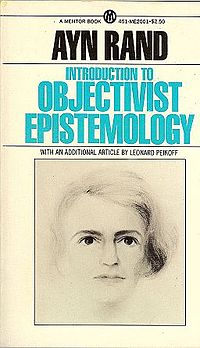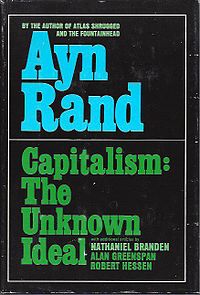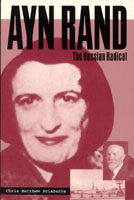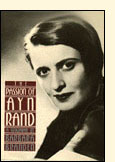
Alice O'Connor, better known by her pen name Ayn Rand, was a Russian-born American author and philosopher. She is known for her fiction and for developing a philosophical system she named Objectivism. Born and educated in Russia, she moved to the United States in 1926. After two early novels that were initially unsuccessful and two Broadway plays, Rand achieved fame with her 1943 novel The Fountainhead. In 1957, she published her best-selling work, the novel Atlas Shrugged. Afterward, until her death in 1982, she turned to non-fiction to promote her philosophy, publishing her own periodicals and releasing several collections of essays.
Objectivism is a philosophical system named and developed by Russian-American writer and philosopher Ayn Rand. She described it as "the concept of man as a heroic being, with his own happiness as the moral purpose of his life, with productive achievement as his noblest activity, and reason as his only absolute".

Nathaniel Branden was a Canadian–American psychotherapist and writer known for his work in the psychology of self-esteem. A former associate and romantic partner of Ayn Rand, Branden also played a prominent role in the 1960s in promoting Rand's philosophy, Objectivism. Rand and Branden split acrimoniously in 1968, after which Branden focused on developing his own psychological theories and modes of therapy.

Leonard Sylvan Peikoff is a Canadian American philosopher. He is an Objectivist and was a close associate of Ayn Rand, who designated him heir to her estate. He is a former professor of philosophy and host of a nationally syndicated radio talk show. He co-founded the Ayn Rand Institute (ARI) in 1985 and is the author of several books on philosophy.
This is a bibliography for Ayn Rand and Objectivism. Objectivism is a philosophical system initially developed in the 20th century by Rand.

Introduction to Objectivist Epistemology is a book about epistemology by the philosopher Ayn Rand. Rand considered it her most important philosophical writing. First published in installments in Rand's journal, The Objectivist, July 1966 through February 1967, the work presents Rand's proposed solution to the historic problem of universals, describes how the theory can be extended to complex cases, and outlines how it applies to other issues in the theory of knowledge.
David Christopher Kelley is an American philosopher. He is a professed Objectivist, though his position that Objectivism can be revised and influenced by other schools of thought has prompted disagreements with other Objectivists. Kelley is also an author of several books on philosophy and the founder of The Atlas Society, an institution he established in 1990 after permanently dissociating with Leonard Peikoff and the Ayn Rand Institute.

Objectivism: The Philosophy of Ayn Rand is a 1991 book by the philosopher Leonard Peikoff, in which the author discusses the ideas of his mentor, Ayn Rand. Peikoff describes it as "the first comprehensive statement" of Rand's philosophy, Objectivism. The book is based on a series of lecture courses that Peikoff first gave in 1976 and that Rand publicly endorsed. Peikoff states that only Rand was qualified to write the definitive statement of her philosophic system, and that the book should be seen as an interpretation "by her best student and chosen heir." The book is volume six of the "Ayn Rand Library" series edited by Peikoff.

Chris Matthew Sciabarra is an American political theorist born and based in Brooklyn, New York. He is the author of three scholarly books—Marx, Hayek, and Utopia; Ayn Rand: The Russian Radical; and Total Freedom: Toward a Dialectical Libertarianism—as well as several shorter works. He is also the co-editor, with Mimi Reisel Gladstein, of Feminist Interpretations of Ayn Rand and co-editor with Roger E. Bissell and Edward W. Younkins of The Dialectics of Liberty: Exploring the Context of Human Freedom. His work has focused on topics including Objectivism, libertarianism, and dialectics.
The Nathaniel Branden Institute (NBI), originally Nathaniel Branden Lectures, was an organization founded by Nathaniel Branden in 1958 to promote Ayn Rand's philosophy of Objectivism. The institute was responsible for many Objectivist lectures and presentations across the United States. Many of those associated with NBI worked on the Objectivist magazines, The Objectivist Newsletter and The Objectivist.

The Romantic Manifesto: A Philosophy of Literature is a collection of essays regarding the nature of art by the philosopher Ayn Rand. It was first published in 1969, with a second, revised edition published in 1975. Most of the essays are reprinted from Rand's magazine The Objectivist.
The Objectivist movement is a movement of individuals who seek to study and advance Objectivism, the philosophy expounded by novelist-philosopher Ayn Rand. The movement began informally in the 1950s and consisted of students who were brought together by their mutual interest in Rand's novel, The Fountainhead. The group, ironically named "The Collective" due to their actual advocacy of individualism, in part consisted of Leonard Peikoff, Nathaniel Branden, Barbara Branden, Alan Greenspan, and Allan Blumenthal. Nathaniel Branden, a young Canadian student who had been greatly inspired by The Fountainhead, became a close confidant and encouraged Rand to expand her philosophy into a formal movement. From this informal beginning in Rand's living room, the movement expanded into a collection of think tanks, academic organizations, and periodicals.

Ayn Rand's philosophy of Objectivism has been, and continues to be, a major influence on the right-libertarian movement, particularly libertarianism in the United States. Many right-libertarians justify their political views using aspects of Objectivism.

The Virtue of Selfishness: A New Concept of Egoism is a 1964 collection of essays by the philosopher Ayn Rand and the writer Nathaniel Branden. Most of the essays originally appeared in The Objectivist Newsletter. The book covers ethical issues from the perspective of Rand's Objectivist philosophy. Some of its themes include the identification and validation of egoism as a rational code of ethics, the destructiveness of altruism, and the nature of a proper government.

Capitalism: The Unknown Ideal is a collection of essays, mostly by the philosopher Ayn Rand, with additional essays by her associates Nathaniel Branden, Alan Greenspan, and Robert Hessen. The authors focus on the moral nature of laissez-faire capitalism and private property. They have a very specific definition of capitalism, a system they regard as broader than simply property rights or free enterprise. It was originally published in 1966.

Atlas Shrugged is a 1957 novel by Ayn Rand. It is her longest novel, the fourth and final one published during her lifetime, and the one she considered her magnum opus in the realm of fiction writing. She described the theme of Atlas Shrugged as "the role of man's mind in existence" and it includes elements of science fiction, mystery and romance. The book explores a number of philosophical themes from which Rand would subsequently develop Objectivism, including reason, property rights, individualism, libertarianism and capitalism, and depicts what Rand saw as the failures of governmental coercion. Of Rand's works of fiction, it contains her most extensive statement of her philosophical system.
Objectivist periodicals are a variety of academic journals, magazines, and newsletters with an editorial perspective explicitly based on Ayn Rand's philosophy of Objectivism. Several early Objectivist periodicals were edited by Rand. She later endorsed two periodicals edited by associates, and a number of others have been founded since her death.

Ayn Rand: The Russian Radical is a 1995 book by Chris Matthew Sciabarra tracing the intellectual roots of 20th-century Russian-American novelist and philosopher Ayn Rand and the philosophy she developed, Objectivism.

The Passion of Ayn Rand is a biography of Ayn Rand by writer and lecturer Barbara Branden, a former friend and business associate. Published by Doubleday in 1986, it was the first full-length biography of Rand and the basis for the 1999 film of the same name starring Helen Mirren as Rand.

The Ayn Rand Cult is a book by journalist Jeff Walker, published by Open Court Publishing Company in 1999. Walker discusses the history of the Objectivist movement started by novelist and philosopher Ayn Rand, which he describes as a cult.














